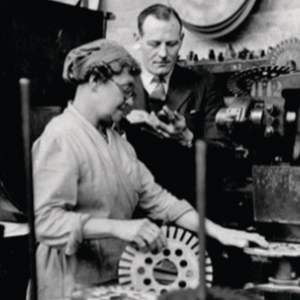 Taylor was born in Germantown (now part of Philadelphia), Pennsylvania. In 1878, he began working at the Midvale Steel Company. As he rose to become foreman of the steel plant, he started to apply himself to thoughts about efficiency and productivity.
Taylor was born in Germantown (now part of Philadelphia), Pennsylvania. In 1878, he began working at the Midvale Steel Company. As he rose to become foreman of the steel plant, he started to apply himself to thoughts about efficiency and productivity.
These thoughts led to the development of what became known as “scientific management”.
In the introduction to his book “The Principles of Scientific Management“, Taylor suggests that :
In the past man has been first; in the futurethe system must be first.
His ‘scientific principles’ were those of systematic study, analysis and the assumption of causal relationships that could be derived and subsequently managed. e.g. the relationship between incentives and effort. He assumed that working systems were generally inefficient – largely because no-one had bothered to make them efficient – and that workers were naturally inclined to be lazy and inefficient – since this was in their own best interest. Therefore managers had to overcome this natural reluctance to put in maximum effort and offer incentives so that worker effort was in the interests of both the company and the worker.
He felt that most managers were ill-equipped to fulfill their role, since they were not trained to analyse and improve work, and seemed incapable of motivating workers. Taylor thought that managers should be able to analyse work (method study) to discover the most efficient way of carrying it out, and then should select and train workers to develop their skills in supporting this method. He felt that financial incentives would motivate workers – but that higher productivity would still result in lower wage costs. In fact, he was a strong advocate of co-operation between workers and managers to mutual advantage. However, even in this there was a tendency to consider workers as industrial resources – as ‘machines’ rather than as sentient beings.
Taylor believed strongly in the concept of measurement. By measuring work, and constantly refining and re-measuring working methods, one could work towards an optimal method.
Taylor promoted the concept of ‘support departments’ that would take some specialisms away from face-to-face managers, though later in life he accepted that the conflict and tension between the generalists and the specialists could be counter-productive.
When judging Taylor with hindsight we must take the time to consider when his work was carried out – the industrial revolution was in full swing, and many ‘factory-based processes’ were relatively new. Taylor was one of the first to realise that systematic scrutiny of such processes could yield productivity increases. As “the father of scientific management” he made a major contribution to the development of productivity science.
see also:
The One Best Way: Frederick Winslow Taylor and the Enigma of Efficiency
Robert Kanigel
Viking Press
ISBN: 0670864021 (May 1997)
